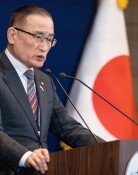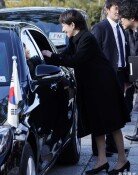Koreas Economy in 2007
The U.S. subprime mortgage crisis hit the global financial market hard. Every time major financial firms announced losses incurred from the meltdown, stock markets showed violent fluctuations. So, American and European central banks cooperated to pump funds into the markets. However, some point out that the turmoil until now only is a drop in the bucket since its seriousness is yet to be clearly identified. Because it brought about the weak dollar, a new order in the international financial market is being predicted.
On November 23, WTI prices closed at 98.18 dollars per barrel on the NYMEX, its highest closing price ever. With increased demand from China, the weakening dollar, and rising speculation, oil prices are nearing 100 dollars per barrel. There are concerns of a global economic slowdown, rising inflation, and calls to cut oil taxes in Korea. In addition, progress in alternative energy development has caused international crop prices to increase.
The Korean government set up various real estate measures such curbing mortgage loans. Therefore, deals in real estate plunged and end users were hit, too. The number of households with one house, which need to pay comprehensive real estate holding taxes, has soared. Unsold houses surpassed 100,000 recently. As a result, 102 construction companies have reportedly closed down as of mid-November, and this number could rise even further.
Korean businesses also suffered in terms of image in 2007. The Federation of Korean Industries fought itself earlier this year when electing its new chief. Although Samsung marked the 20th anniversary of Lee Kun-hees presidency this year, it is undergoing difficulties after former Samsung lawyer Kim Yong-chul raised slush fund suspicions. Hyundai-Kia Motors president Jung Mong-koo went through litigation over illegal funds as well. Its affiliates suffered a special audit from the National Tax Service. Meanwhile, Hanhwa president Kim Seung-youn was sentenced to prison for assault.
Additional negotiations for the KORUS FTA were concluded on June 29. They started in February 206 and are now awaiting ratification form the National Assembly. People expected that the FTA would strengthen the competitiveness of exporting companies, upgrade Koreas sovereign credit rating, and attract foreign investment. However, due to resistance from relatively weak sectors such as agriculture, and some politicians, the agreement was uncertain until the very last.
The Korean stock market was on a roller-coaster ride because of increasing funds and global financial market turmoil. On July 25, the KOSPI index ended at 2,044.22, surpassing the 2,000 closing mark for the first time. However, on August 16, it lost a record 125.91 points, and gained a record 93.20 on August 20. The KOSPI index rose to 2,064.85 on October 31, but was steady under 2,000 after November due to concerns of a protracted credit crunch.
The Capital Market Consolidation act was declared on August 3 to eliminate barriers between financial firms and to increase their size. It will enter into effect in February 2009 and will allow financial companies to run all kinds of financial businesses except for banks and insurance firms. As a result, securities companies and asset management firms can be merged, and investment banks will thrive in the new environment. Additionally, there will be major deregulation in investment, and investor protection measures will be strengthened. Securities companies will be able to offer banking services, such as bank-like payment accounts.






![[단독]김경 “1억원 줄때, 강선우도 함께 있었다” 자수서](https://dimg.donga.com/c/138/175/90/1/wps/NEWS/IMAGE/2026/01/14/133148772.5.jpg)
